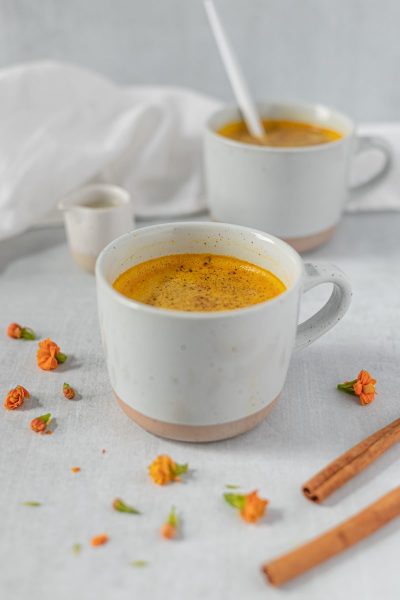Ayurveda and stress
Ayurveda sees stress as an imbalance of one or more of the three Doshas, Vata, Pitta and Kapha. However, Vata dominant people tend to be more susceptible to stress. Increased Vata stress shows as panic, fearfulness, loneliness, and erratic behaviour, both in the body and the mind. Vata is dry in quality; it is cold, light, hard and mobile, erratic and rough. So an increase in these qualities might cause stress that results in constipation, palpitations, lack of appetite, panic attacks, feeling cold, and rushing around like a headless chicken, in order to try to fit everything in.

Soothing and calming spiced milk
Insomnia
A very common symptom of stress is insomnia, with the nervous system being on overdrive. Insomnia is classed as being unable to get to sleep, or being unable to stay asleep, or waking extremely early, before you have had a sound sleep. It affects everyone on occasions, but when we are particularly stressed, it becomes a nightly occurrence for many. To avoid stress, it’s important to keep a calm and realistic pace to your everyday life. Don’t say yes to everything, pick and choose the things your really want to do. Life is not about having a busy diary, it’s also about having time to reflect and recharge the nervous system as well as the rest of the body, and make decisions at a pace that is right for you.
Sleep well
According to Ayurveda, routine and rituals help us to feel less stressed, and ensure we get a good, restful sleep. Here is a simple ritual that instils a sense of calm to the nervous system:
Half an hour before bed, drink this gorgeous, grounding, calming milk drink. It contains fantastic spices that collectively offer digestive, anti inflammatory, sedative, antioxidant, grounding, and nourishing qualities. It also contains ghee, which is clarified butter. Ghee is so much part of Ayurveda, both as part of therapeutic measures for healing, and also as a culinary staple. There has been more than enough research on ghee’s benefits now, and it confirms what Ayurveda has always known. It truly is a healing, calming food that helps to relax the nervous system. Moreover, it pacifies all three Doshas, and helps to build immunity. Ghee lubricates all the joints and muscles, provides essential lipids to the cells, and also keeps the skin, eyes and hair in optimum condition. Eating a few teaspoons of ghee each day is the best way to benefit from its properties.
Milk seems to be frowned upon a lot nowadays, but it is seen as a pure, perfectly balanced, essential and healing food in Ayurveda. Remember, babies can live on only milk for a long time, because it’s such a complete food. Of course, when Ayurveda was first practised, cows lived as organic and natural a life as you could imagine; they ate pesticide-free grass, and they weren’t injected with hormones and antibiotics, or separated from their calves too soon in order to provide milk for large populations of humans. They are considered sacred in India, and are treated accordingly. I would strongly encourage you to only drink organic, unhomogenised (not tampered with to make it look more uniform on the shop shelves) whole milk, and to absolutely make sure that it is from grass fed cows living in small herds, on small farms.
Spiced bedtime milk
1 mugful organic whole milk (see above)
A good pinch each of ground nutmeg, cinnamon, and cardamom
A small pinch of turmeric
A good pinch of slightly crushed black poppy seeds
¼ tsp organic ghee
Method:
Heat the milk in a small saucepan with all the spices until hot. Make sure you mix it from time to time with a small whisk to distribute all the spices.
Pour into your mug which has the ghee sitting on a spoon in it. The ghee will instantly rise to the top, creating a golden puddle of toffee scented, unctuous goodness. Give it a stir, and drink slowly, savouring every sip.
Sleep well.
